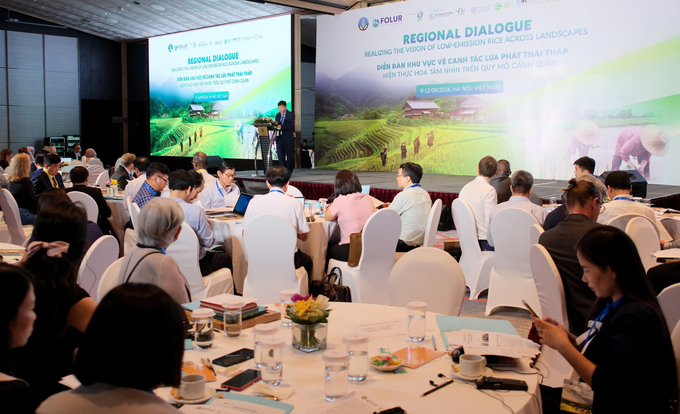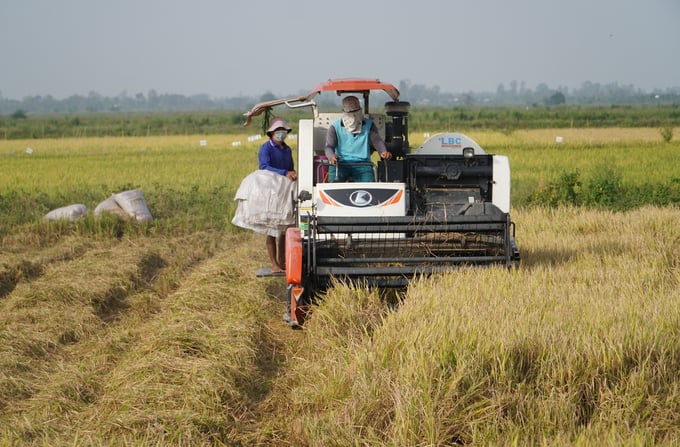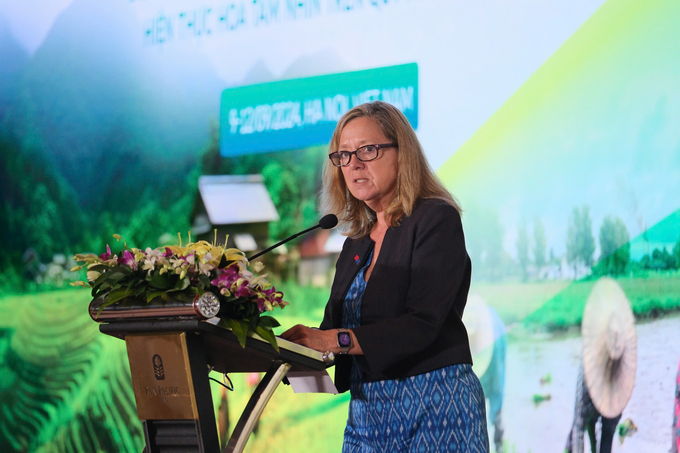May 31, 2025 | 12:45 GMT +7
May 31, 2025 | 12:45 GMT +7
Hotline: 0913.378.918
May 31, 2025 | 12:45 GMT +7
Hotline: 0913.378.918

The Regional Dialogue brings together over 120 participants, including 70 international delegates from FOLUR Programme member countries. Photo: Quynh Chi.
A Regional Dialogue of the Ministry of Agriculture and Rural Development of Vietnam (MARD) and the World Bank-led Food Systems, Land Use and Restoration (FOLUR) Impact Program “Realizing the vision of low-emission rice across landscapes”, begins on September 9, aiming to foster collaboration, build consensus, and identify feasible solutions about the challenges in developing sustainable rice value chains across diverse landscapes.
Seeking to build sustainable landscapes for people and the planet, the Food Systems, Land Use and Restoration Impact Program (FOLUR) is a USD 345 million, seven-year program that aims to improve the health and sustainability of landscapes that produce the world’s food. With the backing of the Global Environment Facility (GEF), the largest multilateral trust fund enabling developing countries to invest in nature, and led by the World Bank, the largest financier of agriculture and food in the developing world, FOLUR is uniquely positioned to improve the sustainability of food value chains.

To successfully execute the 1 million ha rice project, Vietnam must mobilize the support of the private sector, government agencies, and producers who participate in. Photo: Kim Anh.
The world currently produces a staggering 524 million metric tons of rice annually. As a staple crop, rice supplies 20% of the world’s calories, playing a crucial role in food security. The rice sector is also an important source of employment for the rural poor. Smallholders produce 80% of the world’s rice, and 144 million people worldwide work as rice farmers. This does not include the hundreds of millions of people who directly or indirectly depend on the rice value chain for a living. Rice production is responsible for 4.3% of global agri-food system greenhouse gas emissions (GHG), and 16% of agricultural methane emissions. As methane is a short-lived greenhouse gas with a high global warming potential, reducing emissions from rice can have a rapid effect on slowing climate change. Hence, the rice sector’s role in climate action is receiving increasing attention from policymakers and civil society alike.
The Regional Dialogue brings together over 120 participants, including 70 international delegates from FOLUR Programme member countries (Australia, Bangladesh, Benin, Bhutan, Burkina Faso, Canada, China, Chad, Congo, France, India, Indonesia, Italy, Japan, Kenya, Nigeria, Pakistan, Philippines, Sri Lanka, Tanzania, Thailand, UK, USA and Viet Nam), as well as representatives from United Nations agencies, international organizations, civil society organizations, research and technical organizations, enterprises, experts, scientists, and stakeholders. Additionally, 50 Vietnamese delegates from Ministries, Departments, Agencies, local representatives and experts from the Red River Delta, Mekong River Delta, North Central, and Northern mountainous regions are participating in the event.
The dialogue will take place from September 9 to 12 in Hanoi, including three day meetings in Hanoi and one day for a field trip to Thai Binh and Nam Dinh provinces to explore sustainable, low-emission rice production and value chains. The participants will have opportunities to interact with farmers in the fields at Vu Thu and Kien Xuong districts, visiting farmer cooperatives and the ThaiBinh Seed Joint Stock Corporation, to learn about typical landscapes of the Red River Delta as well as irrigation systems and Huu Bi Pumping Station.
Vietnam has made significant high-level commitments at the UN Food Systems Summit (UNFSS), United Nations Framework Convention on Climate Change (UNFCCC), the Climate Summit at COP26 and COP28. These commitments include a pledge to achieve net-zero emissions by 2050, joining the Global Low Methane Initiative, implementing the Glasgow Declaration on Forests and Land Use, and joining the Emirates Declaration on Sustainable Agriculture, Resilient Food Systems, and Climate Action.
In response to global market fluctuations, evolving consumer preferences, and the increasing impacts of climate change, the Vietnamese rice industry is undergoing a substantial transformation in both production and the rice value chain. On 27th November 2023, the Prime Minister approved the Programme on 'Sustainable development of one million hectares of high-quality and low-emission rice, associated with green growth in the Mekong Delta by 2030’’. This aims to re-organize the rice production system based on value chains, implement sustainable farming systems, enhance production and business efficiency, improve the income and livelihoods of rice growers, adapt to climate change, and reduce greenhouse gas emissions.

Ms. Mariam Sherman, the World Bank's Country Director for Vietnam, Cambodia, and Laos speaking at the dialouge. Photo: Quynh Chi.
MARD, in collaboration with the International Rice Research Institute, relevant localities, and stakeholders, conducted a preliminary assessment and evaluation of seven pilot models in five Mekong Delta provinces last week. The models have concentrated on the synchronized application of technical and technological solutions to reduce emissions, the application of mechanization to support farmers and cooperatives in conducting production links with enterprises according to the agricultural value chain, the reduction of cost, the increase in income for farmers, and the effective handling of straws. The models have also considered the possibility and the capabilities of scaling up the model.
Dr. Nguyen Do Anh Tuan, Director of the International Cooperation Department (MARD), has stated that in order to successfully execute the 1 million ha rice project, Vietnam must mobilize the support of the private sector, government agencies, and producers who participate in the project on a variety of scales to attract social investment sources. The financial approach has been a critical factor in facilitating the investment of new technologies, the advancement of the production process, and the improvement of economic efficacy by farmers and enterprises in the rice value chain. Nevertheless, the practical situation demonstrates that enterprises, particularly those of a small and medium scale, as well as farmers, have encountered difficulty in obtaining investment sources for agriculture.
"Rice is a traditional and significant production industry in Vietnam, providing livelihoods for tens of millions of farmers throughout the nation." Vietnam is prepared to collaborate and exchange information with countries worldwide through South-South cooperation in the agricultural sector, with a particular emphasis on rice production. "The regional dialogue is a chance for all of us to engage in discussions, exchange experiences, and align policies to facilitate access to finance, technology, efficient production systems, processing, distribution, and trading in order to promote low emissions and sustainability for stakeholders in the rice value chain in particular and the food system in general," stated the MARD Representative.
Ms. Mariam Sherman, the World Bank's Country Director for Vietnam, Cambodia, and Laos, stated that the WB's support for agricultural transformation initiatives has yielded substantial results in the Mekong Delta. This support has the potential to facilitate the production of high-quality, low-emission rice. Consequently, profitability in pilot models increased by 30%, production costs decreased by 25%, and CO2 emissions decreased by approximately 1.5 million tons. This demonstrates that the 1 million hectare rice program has the potential to transform the lives of rice cultivators by inspiring private investment to support Vietnam's objectives of environmental protection and inflation reduction.

(VAN) Several scientists and farmers are experimenting with soil treatment in some key durian-growing regions such as Cai Lay (Tien Giang), Dak Song, Gia Nghia, and Dak R’lap (Dak Nong).
/2025/05/25/4127-3-073637_820.jpg)
(VAN) Thanks to the promotion from an FAO-implemented project, vegetable production in greenhouses in Moc Chau has seen strong development, from 1.5 hectares in 2021 to nearly 50 hectares in 2024.

(VAN) FAO has recently supported USD 140,000 to implement the project 'Risk mitigation human-animal interface risks through disease control initiatives in pig farming.'

(VAN) The People's Committee of Tra Vinh province has approved an adjustment to the investment policy for the Green Hydrogen Plant project, increasing its area to approximately 52.76 hectares.
![Reducing emissions from rice fields: [2] Farmers’ commitment to the soil](https://t.ex-cdn.com/nongnghiepmoitruong.vn/608w/files/news/2025/05/05/dsc08881jpg-nongnghiep-140632.jpg)
(VAN) Clean rice cultivation model in Thuong Tan commune, Bac Tan Uyen district, is assisting local residents in achieving sustainable agriculture by substantially reducing costs, increasing productivity, and protecting the environment.

(VAN) At the conference to disseminate Resolution No. 68, AgriS introduced its digital agricultural ecosystem and reaffirmed its commitment to accompanying the Government in promoting private sector development and sustainable agriculture.

(VAN) 'Blue Ocean - Blue Foods' initiative is designed to restore marine ecosystems and establish sustainable livelihoods for local communities by cultivating a minimum of 1,000 hectares of cottonii seaweed in the first three years.